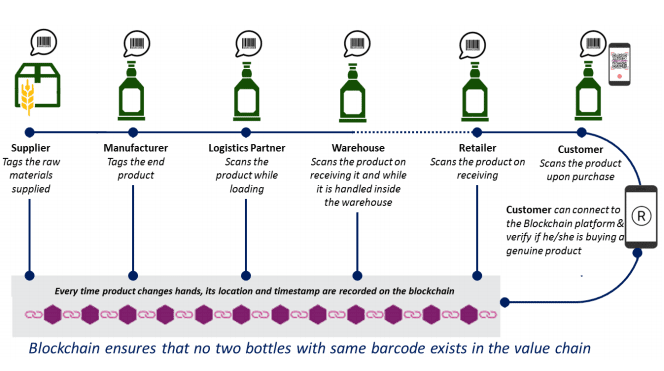Blockchain use case – Liquor Industry to protect Originality and Origin of the Booze
Use of Blockchain in general :
Nobody knew blockchain until bitcoin was developed in 2009 and only then blockchain technology started getting attention. Normally blockchain is known as distributed ledger that records and protects digital data through the use of cryptography. The said technology is applied for network of digital currencies (cryptocurrencies), but its decentralized and secure nature make it a powerful tool for many other industries (i.e. supply chain, charity, trade finance, gaming, tourism, health, medical, etc.).

One of the innovative ways of blockchain use cases is in the supply chain management in the liquor industry.
It is well known fact that liquor industry is highly profitable industry in the world but that is highly susceptible to counterfeit products.
Faster recalls of products and combating counterfeit products are the major reasons for the renowned organisations to allow the use of blockchain technology in the supply chain management of the product/s. International Diamond Corporation, DeBeers is putting its diamonds on the blockchain, Walmart along with other major luxury brands of skincare products, watches, and liquor are doing same thing.
This write up will help you to understand how we can use blockchain technology in liquor industry to combat counterfeit goods which is the major problem in the liquor industry.
This is in continuation to my earlier article on multiple use cases of blockchain technology in the various industries. You can read that write up at TO READ, CLICK HERE
Counterfeit Fake Products | Traceability of Products
In Australia, a tech Startup TBSx3 is helping organisations to implement blockchain technology ensuring, to combat counterfeit goods, provenance, authentication, and traceability in the supply chain of the respective products. TBSx3 is using latest anti-fake technologies, artificial intelligence and blockchain to help brands to optimize and secure their supply chains and connect with consumers across the world.
Major Challenges – Traceability, Tracking | Labelling | Packaging |
First of all, it’s important to ensure the traceability of products. Growth in global supply chains has made tracking of goods more difficult right from the assembly line to the store shelf. Mainly players involved in the supply chain use their own applications which provides brand owners a limited view of their operations.
Fake labelling and refilling bottles with cheaper liquor is common problem in the industry and that can be overcome by using blockchain along with intelligent labelling / packaging and Internet of Thing to combat counterfeit goods.
Consumers can be empowered with the mobile app by the liquor producing company to leverage the origins of the product and leverage the background of the story of the product. Certificate of origin is in trend to upload at the blockchain and consumer can scan the QR code from the product and can reach directly to the origin of the product along with other details available in the supply chain. This kind of approach has been used on pilot basis in wine industry in Australia, China etc.
I hope India also will soon adopt to this approach. In India, there is huge problem of counterfeit liquor.
NFT approach can be used to create labels in such a way that property of uniqueness can be maintained with each label. Doing this, it will be easy for the consumer to identify the uniqueness of the label on the product by scanning the QR code from the packaging / label / bottle.
Uniqueness of the label may represent to the uniqueness of the particular batch of the product or the single product itself like in expensive and rare wine bottles.
In conclusion, we can draw the fact that counterfeiting is the common problem across the world in liquor industry and same can be overcome by using blockchain technology along with artificial intelligence in intelligent labelling and adhesives and further in bottling.


 Bitcoin
Bitcoin  Ethereum
Ethereum  Tether
Tether  XRP
XRP  USDC
USDC  Solana
Solana  TRON
TRON  Dogecoin
Dogecoin  Bitcoin Cash
Bitcoin Cash  Wrapped Bitcoin
Wrapped Bitcoin  Litecoin
Litecoin  Shiba Inu
Shiba Inu  Polkadot
Polkadot  Ethereum Classic
Ethereum Classic  PancakeSwap
PancakeSwap  Decentraland
Decentraland  GALA
GALA  IoTeX
IoTeX  BUSD
BUSD